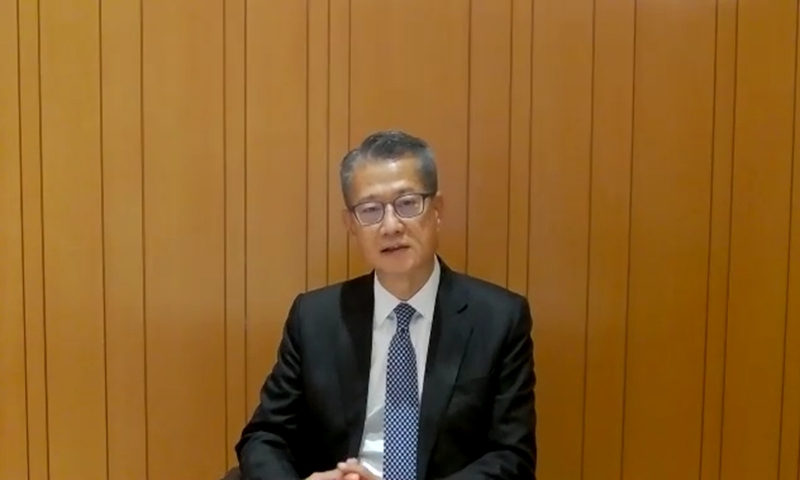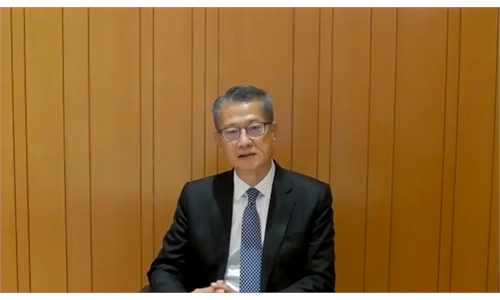New law helps HK's future with economic recovery eyed in Q4: financial chief
Economic recovery eyed in Q4 with social stability

Hong Kong Financial Secretary Paul Chan Mo-po Photo: Screenshot of GT interview
With the implementation of the national security law for Hong Kong, which will restore normalcy and end riots, the city is expected to see signs of an economic recovery in the fourth quarter of 2020, the Hong Kong Special Administrative Region (HKSAR) financial chief told the Global Times on Wednesday.
"Though many uncertainties remain, we hope to get the epidemic outbreak under control sooner. The law will bring us back to normalcy, and we may see signs of economic recovery in the fourth quarter," Financial Secretary Paul Chan Mo-po, who is a member of the Committee for Safeguarding National Security of the HKSAR, told the Global Times in an exclusive interview.
With the implementation of the law, the free market spirit and capitalist system won't disappear, while core advantages of Asia's finest financial hub such as judicial independence, free capital flow and talent remain intact, Chan said.
Faced with growing rumors and groundless accusations about the national security law for Hong Kong, which is designed to fix loopholes to prevent the city from becoming an anti-mainland base amid escalating geopolitical tensions, the city, instead of being engulfed in a new crisis, is embracing more opportunities and a brighter future, according to Chan.
In most coverage of western media that describe the newly enacted law as controversial, Hong Kong businesses are reportedly worried that the so-called sweeping law would undermine the city's role as a global trade and finance hub. Some even claim that the law is bad for business, adding another level of uncertainty. They say clauses on personal data, information and individual privacy could be interpreted in many ways. The latest stance of big tech firms such as Facebook, Twitter and Google on the new law revealed growing fears among foreign firms, media reported.
There have been market rumors, but we have to listen to what the business community really thinks about the law, and wait and see how they act and make decisions instead of making assumptions, the senior official noted. "From our observation, the status of Hong Kong's global financial center would only be enhanced with the implementation of the law," Chan said.
The Financial Secretary added that from the decision to formulate the national security law for Hong Kong and the passage of the draft to enact the law, the local market has been robust and maintained its momentum - which reflects the investment sentiment and general view on the law. "For the business community, the stability and security of Hong Kong is more important," Chan said.
At the early stage of the formulation of the national security law for Hong Kong, it's understandable that the public would have concerns, the official noted. "But with the implementation of the law, all of us will see how the law would be carried out, how it specifically targets four categories of activities which endanger national security. Legitimate rights won't change and normal business activities won't be affected," he said.
The Financial Secretary is now a member of the Committee for Safeguarding National Security of the HKSAR, chaired by Carrie Lam, the chief executive of the HKSAR government, who takes part in analyzing the national security situation in the city, building the law enforcement mechanism, and coordinating resources and staff on relevant matters.
When it comes to information and privacy protection, other financial centers around the world have stricter rules in accordance with their national security laws, such as London and New York. "The provisions of the national security law for Hong Kong are not stricter than theirs," he said, noting that lawmakers have carefully compared and studied the national security laws of the other countries.
While dismissing the rumors and smear campaigns about the new law, the Financial Secretary showed confidence in the vitality and the continuity of the "one country, two systems," which is a "great innovation," Chan said. As long as the loopholes on national security matters have been fixed, the fundamentals for moving forward under "one country, two systems" would be stronger.
The comment echoed Chinese foreign ministry spokesperson Zhao Lijian, who expressed full confidence in the city's future on Tuesday by claiming that after the national security law for Hong Kong is implemented, local residents' fundamental interests and well being will be better protected.
"There will be greater social stability and harmony, and "horses will run faster, stocks will be more sizzling, and dancers will dance more happily," Zhao said.
"What we will do is to keep moving forward, and let the world see how it works and where the law leads us to," Chan said.
Over the past 40 years, the development of the HKSAR has always been relying on the mainland, or the mainland's opening-up and economic reforms, while the city has been transforming itself to adapt to new situations from a light industry manufacturing base to a services-driven and global financial center, the official noted. "It has always been backed by the motherland and connecting the world. In the future, we need to work more on how to integrate the city into the overall national development plan," he said.
The yearlong social turmoil, triggered by the anti-extradition movement in 2019, has dragged the HKSAR into a deep recession, with the unemployment rate at 5.9 percent - the highest in 15 years, as the city faces multiple challenges like the coronavirus outbreak and sluggish trade.
Among the four types of offenses targeted by the national security law, a person who funds criminal or terrorist activities shall be guilty, which mirrors an incident amid the social turmoil in 2019 when police froze HK$70 million ($9 million) raised by activists to support Hong Kong's anti-government protesters, and multinational bank HSBC faced a backlash in Hong Kong after closing the account with funds used by Spark Alliance.
While some observers of the Hong Kong social unrest expect more similar cases of "black hands" and "dirty money" behind rioting activities, Chan noted that under the coordination of the committee for safeguarding the national security in Hong Kong, such cases would be handled more efficiently.
"As long as companies do not engage in those four types of offenses, they won't see any changes in doing business in Hong Kong," he said.
Given the rapid change in the global environment and external factors becoming more and more complex, Hong Kong should not be a place which forces can exploit, or become an anti-mainland base, which is extremely important, Chan noted.


